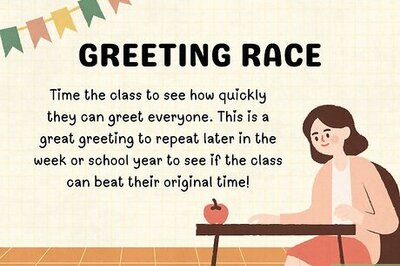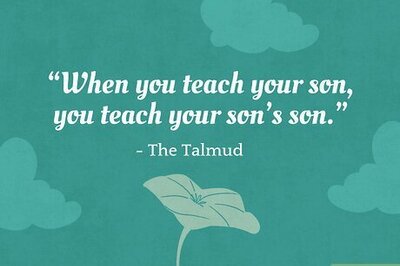
views
- In a short-term relationship, there are no long-term commitments or expectations about starting a future together.
- Typically, short-term relationships can last as little as a week or up to a year, whereas long-term relationships may end up in marriage or life-long fulfillment.
- The lack of commitment in short-term dating can help you understand your dating preferences, boundaries, and future expectations.
What is a short-term relationship?

A short-term relationship has no long-term commitments. Short-term relationships are exactly how they sound: short. This specific type of dating is for those who aren’t looking for a life-long partner but a causal sexual or romantic relationship instead. Both parties usually aren’t interested in marriage, having kids, or spending the rest of their lives together. They focus on the present moment rather than the future. Friends with benefits (FWB), one-night stands (ONS), and vacation flings are all examples of short-term or casual dating. Short-term relationships can last weeks, months, or even a year—it all depends on the couple and their individual needs. Now, it’s important to note that short-term and long-term relationships can end at any given moment. Not all relationships last, and that’s okay! Some relationships might end, regardless of if they’re short- or long-term, because the people aren’t a good fit for one another.
Short-Term vs. Long-Term Relationships

A long-term relationship focuses on a future together. The main difference between these two relationships is that long-term relationships often end in a lifelong commitment, while short-term relationships don't. If you’re ready to settle down with someone, you’re probably seeking a long-term relationship. If you want to date around and discover your likes and dislikes, you likely want a short-term relationship.

Short-term can become long-term, but long-term can’t become short-term. Think of it this way: once you’ve committed to something, it’s harder to back down without calling it quits. If you enter a short-term relationship and catch strong feelings for your partner, you could potentially start building a future with each other (as long as both parties are on the same page). On the other hand, if you’re in a long-term relationship, stepping away from emotional commitments is more difficult because a future has already been established or imagined.
How to Have a Short-Term Relationship

Be clear about your intentions upfront. When going into a short-term relationship, it’s best to let your potential partner know what you hope to gain from the relationship as soon as possible. Lay down the ground rules—are you both allowed to see other people? Will the relationship have a definitive end? This is an excellent way to protect yourself and your emotions. For instance, if you’re using a dating app like Hinge, put that you’re only interested in short-term dating somewhere in your profile. This way, potential matches will know what to expect before they message you. In other words, don’t leave them guessing about what you want, as this could lead to misunderstandings later.

Be respectful of one another. Just because you’re not fully committed to the relationship doesn’t mean you can disregard your partner’s feelings. Feelings can be hurt in any relationship, so pay attention to your partner’s emotions as well as your own. Set boundaries for the relationship and discuss them with your partner. Then, ask them to do the same. For example, maybe you only want to hang out a few nights a week so you have time to see your friends and family. Communicate openly and honestly with your partner, regardless of how long you’re together, to stay in tune with their emotions. For instance, vocalize what you like and dislike sexually with your partner before heading to the bedroom, or express if something they said hurt your feelings.

Meet different people. One of the advantages of short-term dating is that you can experience multiple romantic partners in a short amount of time. Don’t be afraid to put yourself out there, mingle, and experiment romantically. After all, short-term dating is all about finding yourself. While experimenting is fun, remember to practice safe sex, especially when you’re not in an exclusive relationship.

Set a time frame. While this step isn’t crucial, it can help maintain boundaries in the relationship. For instance, maybe you met someone cute on vacation and want the fling to end when you get back on the plane. When the relationship ends is totally up to you and your partner; just make sure you both agree on when that is. It’s perfectly okay to move on from the relationship once it’s no longer serving you. Short-term relationships can last 1 week, 1 month, or 1 year—it all depends on your needs.
Benefits of Short-Term Dating

You get to know yourself better in a short-term relationship. One of the many benefits of a short-term relationship is that there’s a place for you to explore your own dating preferences. Because there are zero commitments or expectations, you’re free to end or start a relationship whenever you like. Focus on building your self-esteem by expressing what you want and need in the relationship. For instance, speak up if you want the relationship to end at a specific time or if you’d like things to stay strictly sexual. Ending a relationship is hard, even if it’s short-term. So, be kind to yourself and view this closing chapter as a learning experience.

You can connect without commitment. Just because you’re not fully invested in a future together doesn’t mean you can’t have an emotional connection with a short-term partner. Short-term dating is the perfect way to find which personalities you resonate with the most. Ask your partner meaningful questions when you’re together to get to know them better. Stick with open-ended questions like, “What’s the best gift you’ve ever received?” to keep the conversation going.

There’s less stress and expectations in short-term dating. An amazing benefit of short-term dating is that there’s less stress around being the “perfect couple.” There are no expectations for where the relationship is heading. You can both focus on the present moment. Chat with your partner about what you hope to gain from the relationship. This way, you’re both aware of each other’s wants and needs right away.
Is it easier to recover from a short-term relationship?

Recovering from a short-term relationship isn’t necessarily easier. Although you may not have known your former partner long or made a deep emotional connection, the breakup can still be painful. It takes most people around 6 weeks to fully move on from a relationship, and that doesn’t exclude short-term dating. It may be easy to jump right back into a relationship after moving on from a short-term relationship, but take a few days to focus on yourself first. What did you learn from the previous relationship? Is there something you’d do differently next time? Did you discover anything new about yourself?



















Comments
0 comment